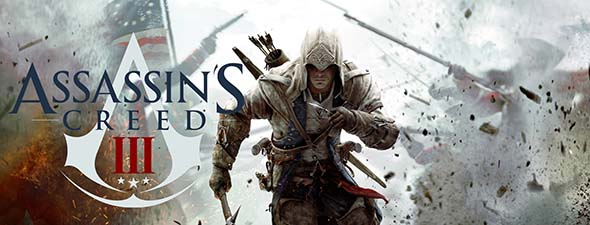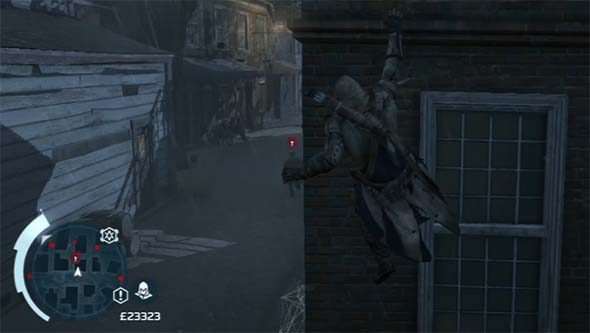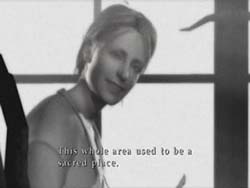
I never really hopped onto the Assassin's Creed bandwagon when the first one was released in 2007. The historical setting and gameplay concepts were intriguing and I wanted to play it, but I wasn't sure if I would like it enough to warrant an outright purchase. And since Ubisoft never bothered to release a playable demo on the PlayStation Network, I never played the game.
So I missed the first two games and their various spin-offs. But when I started seeing information about the third game, and its setting during the American Revolution, my curiosity piqued. The trailers made it look as though parts of the game were played during large-scale battles, and I thought that would be really cool to play. So when I found that a friend (Huh?Mr.Box!) was willing to let me borrow his copy, I decided to give it a chance.
And boy was I disappointed!
My core complaint with Assassin's Creed (and many other games like it) is that I don't like how dumbed down the controls are, and how little actual control the user has. The run button is also the "climb" button and sometimes the "jump" button (even though there is a dedicated "jump" button). I've always held that when a single button does everything, then it really does nothing. Assassin's Creed regularly feels like I am not playing the game; a procedural function created by the developers is playing the game.
Instead of the game just doing what the player tells it to do, it has to determine which of several pre-determined context-sensitive actions the developers decided to pre-program. You might want to try to sprint through a narrow alleyway between two close buildings to chase a courrier, but if you're just a few pixels off, you end up jumping up the side of the wall and climbing to the top of the building. And then it's a pain in the ass to get back down, and the courrier is now two blocks away.

Because I wasn't lined up perfectly, the free run forces me to climb up this building,
when all I really wanted to do was chase the courier through this alley way.
Maybe I want to jump off of a building onto a nearby tree branch in order to stay above a group of enemy Redcoats that I'm trying to stealth past. But for some reason, the game decides to make my character leap past the tree branch and right into the middle of the group of bad guys. Now my cover is blown, I'm stuck in combat, and maybe I've even failed a bonus objective or two.
These sorts of problems could be avoided if the "climb" and "jump" commands were their own buttons separate from the "run" button...
[More]
ae52b9af-d384-46f5-b50f-c751d6ac7cf6|1|5.0
Tags:Assassin's Creed, Assassin's Creed III, Ubisoft, historical fiction, history, assassin, parkour, colonial America, American Revolution, United States, minuteman, minutemen, Britain, Boston, sailing, Achievement unlocked, John de Lancie

In one of my earlier posts titled "'Silent Hill' is NOT about 'repressed guilt'; it's about occultism!", there seemed to be some misunderstandings about the interpretations that I offered. For one thing, reader Malik commented:
"I have to disagree. The series has never established the cult as the basis for the goings-on in Silent Hill. It is never explicitly stated that the cult or Alessa are the true source of the supernatural power ..."
The commentor is correct on that point. Though, I don't think I ever said that Alessa and the cult were the ultimate source. If you got that impression, then there might have been a misunderstanding or miscommunication, and I apologize for not being clear. To be clear: I was arguing that the plots of the game were focused on the cult and Alessa, and how they affected this supernatural power -- not that the cult is the cause of the power. I thought about responding with my own comment on that original post, but I felt that it would be more appropriate to just write a new blog article about it, so that I could spend more time exploring the town's history, as it was established by the original creators. So, Malik, I hope you read this. and I hope it makes more sense. I'd love to hear your feedback.
Please note that much of this post is speculation. The games themselves provide very little concrete information about the extended history of the cult and region -- especially prior to the Civil War. The following is all retroactive explanation and may not represent the original intentions of the creators. This will be my own, personal opinion and interpretation regarding the nature of Silent Hill's otherworldly power.
The Place of the Silent Spirits
I never intended to imply that the cult and Alessa created the supernatural phenomena, nor that they are the power's ultimate source. I agree that the power likely existed (in some form) far prior to the events of the first game.

Mary refers to Silent Hill as a "sacred place".
Mary's comments regarding the place being "sacred" in the past implies that early inhabitants (probably the Native Americans) were aware of the supernatural effects of the region going back hundreds - maybe thousands - of years. Since the Natives saw the place as being "sacred" and beautiful, I tend to believe that the power did not originally manifest demons or project people's nightmares onto reality during these periods of history. Instead, I would imagine that the force (whether conscious or not) would have been more benign - maybe even benevolent.
We don't know much about the natives' beliefs prior to the arrival of European colonists, and what little we do know is possibly clouded by the lens of the European colonists and cultists.
Based on what is known about real-world Native American beliefs, it is probably safe to assume that the natives of the Toluca Lake region would likely have worshipped any regional supernatural power as "ancestral spirits" or as "spirits of nature". The Book of Lost Memories can be found in Silent Hill 2 after beating the game, and it supports this idea and tells us about the nature spirits:

"They called this place 'The Place
of the Silent Spirits'. By 'spirits',
they meant not only their dead
relatives, but also the spirits that
they believed inhabited the trees,
rocks and water around them."
- Lost Memories book (Silent Hill 2)
The name "Place of the Silent Spirits" may simply be an innocent callback to the game's title, or it could be a significant clue. The fact that the spirits were "silent" implies that the natives were not able to talk to it; or at least, the spirits did not talk back. This implies that the "spirits" are probably not a conscious entity. Even though it can apparently react to the thoughts - and even desires - of the people it comes in contact with, it may not have an intelligence or will of its own (which I explained in my earlier post about repressed guilt)...
[More]
643444f5-4ba4-4d6c-818b-921ecc1c7154|8|5.0
Tags:Silent Hill, Silent Hill 2, Silent Hill 3, Silent Hill 4: the Room, history, cult, occult, black magic, religion, spirituality, Christianity, Satan, god, Native Americans, Glooscap, Otherworld, paradise, Maine, colony, Civil War, colonial America, Toluca Lake, tourism, drugs